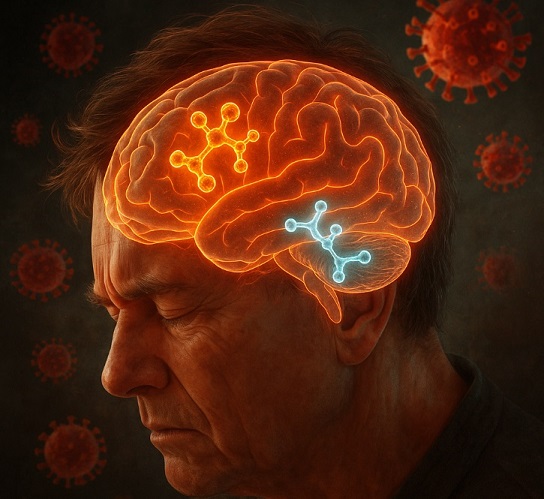COVID-19 Infection Triggers Unseen Brain Chemistry Reboot That Could Explain Strange Neurological Symptoms
Nikhil Prasad Fact checked by:Thailand Medical News Team Jun 17, 2025 8 months, 1 week, 1 day, 1 hour, 28 minutes ago
Thailand Medical News:
Shocking Study Reveals COVID-19 Could Be Rewiring the Human Brain at a Chemical Level
In a groundbreaking discovery that’s sending ripples through the neuroscience and medical communities, researchers from Vita-Salute San Raffaele University and the IRCCS San Raffaele Scientific Institute in Milan, Italy, have found that COVID-19 may be chemically altering the brain in ways never seen before. These changes may help explain why so many people experience long-term neurological symptoms like brain fog, memory issues, anxiety, and depression long after recovering from the virus.
 COVID-19 Infection Triggers Unseen Brain Chemistry Reboot That Could Explain Strange Neurological Symptoms
COVID-19 Infection Triggers Unseen Brain Chemistry Reboot That Could Explain Strange Neurological Symptoms
According to the study, patients recovering from COVID-19 showed dramatically higher levels of two key brain chemicals—glutamate and N-acetyl-aspartate (NAA)—compared to healthy individuals. These chemicals are critical for brain function, and their abnormal levels could be driving both the symptoms and the unexpected recovery patterns seen in long COVID sufferers. This
Thailand Medical News report explores how the very chemistry of the brain appears to be rewiring itself post-infection in ways that may be both harmful and, surprisingly, beneficial.
Brain Chemicals Spike After COVID and May Affect Thinking and Emotions
The study examined 64 COVID-19 survivors aged 18 to 72 and compared them to 33 healthy individuals. Using advanced brain scans and spectroscopy, researchers measured levels of metabolites and assessed white matter—brain tissue that supports communication between different brain regions.
Shockingly, even though more than half of the COVID group reported ongoing cognitive problems, such as brain fog or memory lapses, brain scans told a different story. These individuals had significantly elevated levels of glutamate and NAA in regions of the brain linked to decision-making, focus, and emotional regulation—namely the dorsolateral prefrontal cortex (DLPFC) and the anterior cingulate cortex (ACC).
Glutamate is the brain’s primary excitatory neurotransmitter—it powers nerve cell activity and communication. NAA, meanwhile, is considered a marker of healthy neurons and is involved in maintaining brain cell energy and myelin sheaths. Together, these chemicals form the basis of cognitive clarity, emotional balance, and memory processing. Their abnormal elevation post-COVID is like finding the brain in overdrive, scrambling to recalibrate.
White Matter and Chemical Changes Suggest Brain is Trying to Repair Itself
Alongside the rise in glutamate and NAA, the research found improvements in white matter microstructure—evidence that the brain may be trying to repair itself. White matter integrity was assessed through markers like fractional anisotropy (FA), which was higher in the COVID group. Meanwhile, damage indicators such as radial diffusivity (RD) and mean diffusivity (MD) were lower.&
lt;br />
What makes this finding even more intriguing is that glutamate’s positive effect on cognitive function was only seen in those with stronger white matter integrity.
This suggests that the brain chemicals may be helping the recovery process—but only if the physical architecture of the brain hasn’t been too badly damaged.
Further, NAA was linked to stronger functional connectivity between brain regions, especially in the posterior cingulate gyrus, a core hub involved in memory and awareness. It’s as if the brain is rewiring and rebuilding itself chemically and structurally after the virus has left the body.
A Chemical Reboot or a Hidden Danger?
While these findings may seem optimistic, they also raise alarm bells. The fact that such fundamental brain chemistry is being altered by COVID-19 suggests the virus reaches deeper into the central nervous system than previously understood. If the brain is forced into a state of metabolic compensation, could this lead to long-term imbalances or even neurodegeneration in some individuals?
Previous studies had already shown that COVID-19 could shrink grey matter, damage brain pathways, and even infect astrocytes—cells that help regulate neurotransmitters like glutamate. Now, this study provides hard biochemical evidence that the virus doesn’t just cause temporary disruption—it might trigger a full-blown chemical reboot of the brain.
Conclusion
This new research strongly suggests that COVID-19 triggers a profound shift in brain chemistry—elevating glutamate and N-acetyl-aspartate in regions tied to cognition and emotion. These changes may be part of a natural repair process, helping survivors recover from cognitive impairments. However, the long-term consequences of these metabolic alterations are still unclear. While some individuals may benefit from this neurochemical reboot, others might face lingering or even worsening neurological symptoms if their brain’s wiring cannot adapt. Understanding this delicate balance could be key to developing future treatments for long COVID and related neurological disorders.
The study findings were published in the peer reviewed journal: Neuroscience.
https://www.sciencedirect.com/science/article/abs/pii/S0306452225006980
For the latest COVID-19 News, keep on logging to
Thailand Medical News.
Read Also:
https://www.thailandmedical.news/news/new-study-uncovers-how-infections-like-covid-19-trigger-brain-blood-vessel-damage
https://www.thailandmedical.news/news/scientists-raise-alarms-after-discovering-that-covid-19-can-cause-cytotoxic-brain-lesions-in-the-corpus-callosum
https://www.thailandmedical.news/news/german-study-finds-that-just-sars-cov-2-spike-protein-alone-can-trigger-brain-damage-similar-to-parkinsons
https://www.thailandmedical.news/articles/coronavirus
